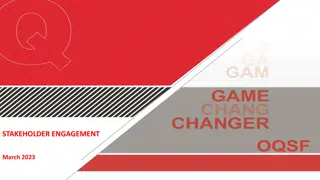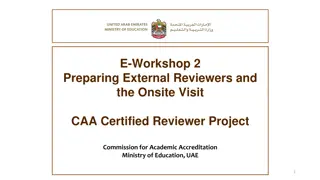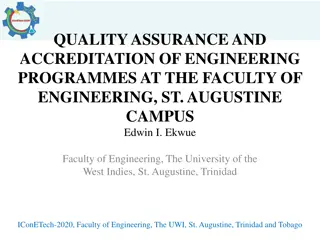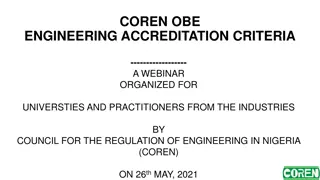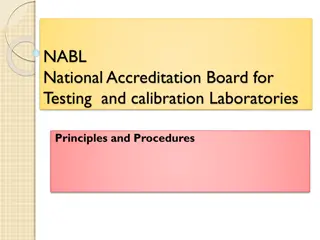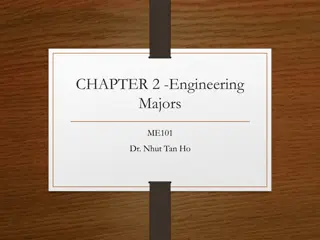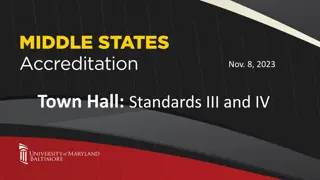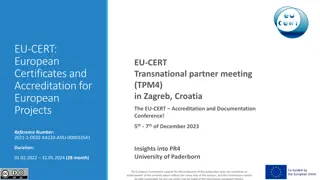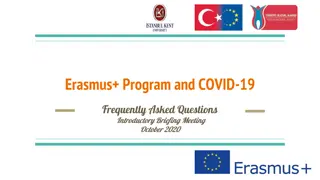Accreditation of Engineering Qualifications and Mobility of Engineers in Africa and Asia: The COREN Experience
This workshop delves into the accreditation of engineering qualifications to international standards and the mobility of engineers and technologists in Asia and the Pacific, focusing on the specific experience of accrediting engineering programs in Nigeria by the Council for the Regulation of Engineering in Nigeria (COREN).
Download Presentation

Please find below an Image/Link to download the presentation.
The content on the website is provided AS IS for your information and personal use only. It may not be sold, licensed, or shared on other websites without obtaining consent from the author.If you encounter any issues during the download, it is possible that the publisher has removed the file from their server.
You are allowed to download the files provided on this website for personal or commercial use, subject to the condition that they are used lawfully. All files are the property of their respective owners.
The content on the website is provided AS IS for your information and personal use only. It may not be sold, licensed, or shared on other websites without obtaining consent from the author.
E N D
Presentation Transcript
FEIAP 2015 Workshop Theme: Accreditation of Engineering Qualifications to International Standards & Mobility of Engineers & Technologists in Asia and the Pacific Accreditation of Engineering Programs in Nigeria: The COREN Experience By: Engr. Kashim A. Ali, FNSE, mni, President, Council for the Regulation of Engineering in Nigeria (COREN) October 2012 Kuala Lumpur Malaysia, 27th May, 2015
Outline 3 COREN Introduction 4 Mandate & Functions of COREN 6 Accreditation of Engineering Programs in Nigeria 11 The New Benchmark Minimum Academic Standard (BMAS) 12 Objectives of the New BMAS 13 Conclusion 2
COREN Introduction History of COREN 3
Mandate of COREN The Engineers Act empowers COREN to 1. Regulate and Control the Practice of Engineering in all aspects and ramifications 4. Ensure appropriate training for Engineering personnel 2. Ensure Engineering is practiced according to acceptable standards COREN Mandate 3. Ensure Engineering Ethics are held sacrosanct 4
Functions of COREN 1 COREN is responsible for the accreditation of the engineering programs in the following academic establishments: Universities, Polytechnics Technical Colleges Accreditation of Engineering Programs COREN carries out the registration of engineering personnel through: Professional Interview NSE, NATE, NISET, NAEC Review of similar approved qualifications such as P.E from the US and Canada; and C.Eng from the UK 2 Registration of Engineering Personnel COREN issues practicing licenses to the following firms: Consulting Engineering Engineering Contracting Engineering Manufacturing/Production Fabrication/Repair/Maintenance Engineering Service Provision 3 Licensing of Engineering Firms 5
Accreditation of Engineering Programmes . . . This activity is a function of the Professional Development Department of COREN Engineering Personnel Registration Section 1 (1) (b) of Decrees 55 of 1970 and 27 of 1992 (amendment), now the Engineers (Registration, etc.) Act CAP E 11, 2004, empowers COREN to: determine what standards of knowledge and skills are to be attained by persons seeking to be registered as engineering personnel and to raise those standards from time to time as circumstances may permit Engineering Programs Accreditation Licensing of Engineering Firms Multi-technology Future COREN is responsible for the accreditation of the engineering programs in the following academic establishments: Universities, Polytechnics and Technical Colleges For this purpose, the Act provides that COREN shall conduct visitations to Engineering Institutions in Nigeria or elsewhere for the purpose of: Accrediting their courses (sections 7 and 8 of the Decrees); Withdrawing any previous approvals, if so warranted and as prescribed in sub-sections (3) (5) of section 7
Procedures for Accreditation Institution to Obtain primary approval from NUC (Universities) or National Board for Technical Education for Polytechnics and Technical Colleges Initiate The University will inform COREN of the NUC approval and then invite COREN to come for the professional Accreditation. Stage 2 COREN will then constitute a committee comprising of seasoned professionals from the Academia and Industry headed by a Council member for the exercise Stage 3- Universities Stage 3- Polytechnics and Technical Colleges While that of Polytechnics and technical Colleges is conducted by NBTE with COREN Representative leading the team. 7
Requirements for Accreditation The Accreditation visitation to the Engineering Programmes in Universities, Polytechnics (and Monotechnics), and Technical Colleges is a Quality Assurance mechanism to ensure that Engineering programmes meet the defined Requirements in: Academic Structure (Curriculum) Staffing (Academic, Technical and Administrative) Physical Facilities (Laboratories, Workshops, Classrooms, Office accommodation, Environment, etc) Library Facilities Information and Communication Technology (ICT) Management and Funding 8
Resource Persons for Accreditation Highly knowledgeable and experienced Engineers drawn from the Industry and Academics are carefully selected as Resource Persons on Accreditation Visitations. They are expected to have the following characteristics Fair & Firm Continious Improvement Registered with COREN for not less than 6 years Be firm and fair in the discharge of the responsibility High Level of Integrity Well Informed Persons must also be seen as active in the activities of the Engineering Profession Display high level of integrity Vast Industry Experience Licensed Possess the current practising license by being financially up to date. Usually senior engineers with not less than 10 years of post qualification experience 9
Challenges of the Program The existing Engineering Curriculum is not universally recognized and also limited to local needs Diversion of results of accreditation exercise by COREN and NUC Lack of universal mobility of Engineering graduates Inadequate professional linkage within Africa and beyond
The New Benchmark Minimum Academic Standard (BMAS) It is in compliance with this that the Council developed the guidelines for accreditation of Engineering programs Section 9 sub section 6 of the COREN Act provides: An educational institution for the training of persons in the engineering profession shall submit syllabus of its program, content and minimum facilities to the Council for approval before a course approved by the National Universities Commission or the National Board for Technical Education, or any other engineering body, is commenced". However, after years of use, it became obvious that the guidelines needed to be reviewed and upgraded to meet up with the current trends It also became imperative from observations of various stakeholders that Accreditation Scoring Criteria needed to be reviewed to strengthen the process As a result, a new BMAS was proposed The Council then put together various practitioners of Engineering from the industry and academia to hold a workshop on the 10th and 11th of May, 2013 in Abuja, Nigeria to develop the BMAS and the new Accreditation Scoring Criteria. By June 2014, the new BMAS was approved by Council for use 11
Objectives of the BMAS The new BMAS is intended to achieve the following in collaboration with African and the international community: Universally acceptable Engineering curriculum across Africa and beyond Improved Professional inter and intra continental mobility Uniform standard for training and certification of Engineers across Africa and beyond. Enhanced professional linkages within African and beyond Development of a common platform for the training and assessment of Engineering personnel 12
Conclusion Quality Assurance of engineering education is of outmost importance to its development While many systems of accreditations exist, there is diversity in coverage, quality and geographical locations. There is therefore the urgent need for international collaboration in the training and certification of Engineering personnel for the ultimate goal of ensuring uniform standard and mobility. 13



